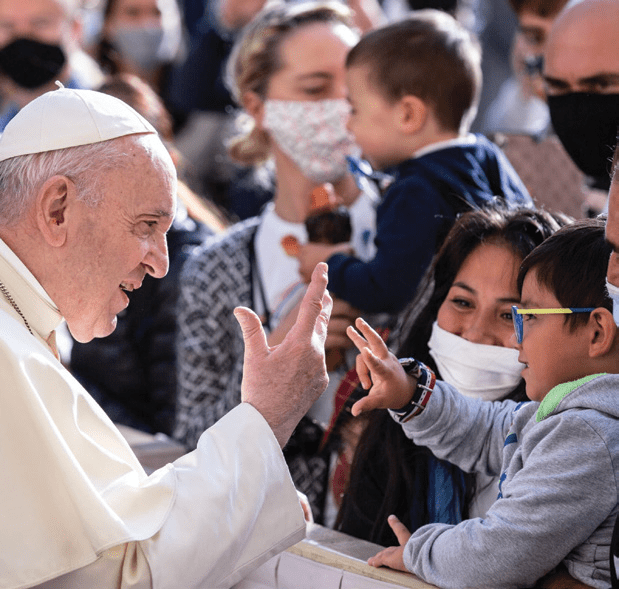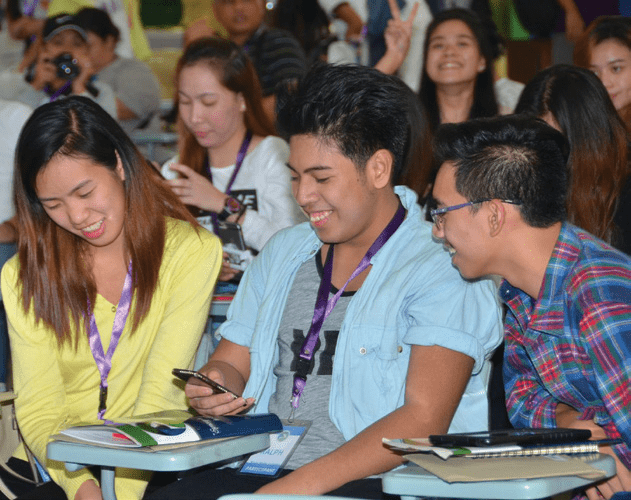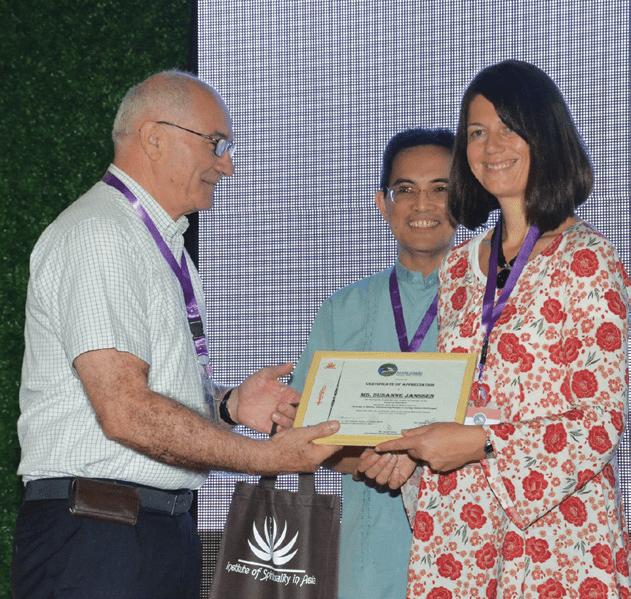New City: Can you explain to us how the “culture of encounter” is related to communications media?

Susanne: There are different opinions: some wonder if the current forms of media facilitate a culture of encounter or if they actually create obstacles. Just consider the hateful comments on Facebook or when teens are bashed for their looks on Instagram or TikTok. The influence is significant and too often runs along a negative vein. And do we even know who is behind these posts?
Social media’s business model is geared towards drawing attention and stimulating conflict. Websites and applications like Facebook, Twitter, YouTube, Instagram, and even LinkedIn use similar strategies to make a profit. They tout the simple saying, “the user is the product,” and use these platforms to “sell” our attention to their real clients: the advertisers. The more time users spend on the app, the more ads they will see, allowing advertisers to generate revenue, thereby increasing the platform’s profits. Anger, conflict and divisions increase the number of posts, increase the attention, and therefore, augment the revenue. Division brings more money!
But then, from time to time, really touching stories come up that show courage, kindness, and love, that go viral and inspire others.
So, does social media have a part to play in promoting a culture of encounter, or should it be written off or at least censured as a detriment to the building of authentic interrelationships? It seems to me that something can be said for both perspectives!
If we have learned anything from the pandemic, it is that, at a moment when we all needed to be in lockdown, video conferencing and messaging kept us connected. We have all attended or organized Zoom birthday parties or baby showers; we also prayed for our loved ones who passed away even on distant continents; and watched faraway weddings without boarding a plane.
Personally, I have to say that there are many advantages to working together on programs, exchanging ideas, and connecting with friends who live in my home country, more than 6,000 km away.
New City: True! In this time of pandemic, social communications have introduced us all to new ways of being “present” in one another’s life. However, can these new ways ever be a substitute for an in-person encounter?
Susanne: With the pandemic in its third year, people are yearning to meet in person. Young people who were born with smartphones and use social media as second nature are “zoomed out” and want to play and chat face-to-face. And while it’s great to watch a webinar while eating lunch or dinner, that doesn’t have the same effect as attending an event in person.
After more than 2 years, I recently went to a live concert, and it was amazing, just to BE there and listen to the music. No googling, messaging and posting, only feeling and absorbing the music while being there with a group of friends!
New City: We understand perfectly what you mean. Most of us desire to finally experience being physically present in many important events of our life, to foster authentic and deeper bonds with people who are part of our journey. Can you enlighten us further on the “culture of encounter?” How can this be part of our style of living?

Susanne: Pope Francis used this term in his encyclical Fratelli Tutti – All brothers and sisters. Creating a culture of encounter begins with realizing that “we are all in the same boat.” To see all creatures as our sisters and brothers is to value the interconnectedness of our universe. In a world dominated by seemingly unstoppable technocratic imperatives, Pope Francis looks not to frantic human effort, but trusts rather in the healing and reconciling mercy of God.
In an interview, he explained: “For me, this word is very important. Encounter with others. Why? Because faith is an encounter with Jesus, and we must do what Jesus does: encounter others.” Pope Francis puts these encounters in the context of our divisions, and care for creation and for each other – no matter how different we are, because we are all sinners who need God’s forgiveness.
Like the example of St. Francis of Assisi who transformed the culture of his time, Pope Francis hopes that respectful encounters with those who are different can bring healing and hope to our world.
It is this spirit of encounter that we need to live out. This is the real conversion! And this spirit of encounter can be lived in face-to-face encounters, as well as in communications media.
New City: To give us a clearer idea of what it means to create a meaningful encounter with others, can you tell us some concrete experiences on this?
Susanne: Allow me to share with you two experiences from my work, one online and one face-to-face.
In our magazine, we try to feature hot topics like racism, immigration and abortion – all pro-life issues and therefore, important. After the death of George Floyd, we had an issue on racism in August 2020. We invited some members and friends of the Focolare to share their experience of discrimination.
After the magazine was delivered, we got mostly very positive comments. However, after a while, some of our readers shared their dismay with the content of the magazine. They felt it was slanted, accusatory, and not consonant with their beliefs. Instead of bringing unity, it seemed that our articles were divisive even among people who clearly wanted to live for a united world, too.
Of course, reading those emails challenged us, and we carefully re-examined our work. While there’s always a way to be more balanced and cover all different aspects, we felt that some points that were raised were merely misunderstandings. However, we didn’t want to defend ourselves… instead, an idea came to my mind: why don’t we “practice what we preach,” meaning, try to dialogue? We invited these readers for a Zoom meeting to better understand each other’s points of view.

We started with the premise to respect and welcome each other, no matter what opinion someone would express. We took time for each of us to introduce ourselves, and then we as Living City staff just listened. We understood some concerns, and we did not defend ourselves, but tried to explain why we chose the authors and some photo illustrations.
It was a beautiful moment of dialogue on Zoom, expressing different opinions without judging, and I learned a lot! It didn’t really matter that we were hundreds of kilometers apart; at that moment, video conferencing was enabling a real encounter. We were able to understand and appreciate each other.
A couple of months later, on another topic, we had a similar reaction from other people who were upset just about one phrase in an interview! Again, media enabled us to meet, and people voiced their frustration at not being heard, as if their opinions didn’t matter. I needed to control the impulse to defend myself and set aside my decisions to be open to an encounter – to build family and learn from those who have a different opinion.
On another topic, we received a beautiful reflection on the reality of old age from a married focolarino.1 We published the article, then planned a webinar which was held recently. For that, I asked if I could interview him. I didn’t want to push it because I wasn’t sure if it would be a good idea, or if it would be stressful or even difficult for him. Many years have passed since his days as a professor, and he admits that he isn’t as good at explaining things as before. But I felt there was a treasure there… and many people could be touched by his witness, like giving spiritual “glasses of water” (Mt 10:42) that can be multiplied by media. So I went with a video producer who offered his help, and the interview was truly unforgettable. It was a precious moment of encounter, where God was present among us. And we needed to be physically together to feel the full impact of his experience.
The same happened when I attended Pope Francis’ Mass in Quebec City. There I was able to interview some of the survivors of past abuse in the residential schools run by the Catholic Church. In this beautiful shrine, filled with many indigenous people, I could feel the emotions, see their faces and their reactions. It made me understand so much more about their journey to healing after experiencing abuse and the trauma of separation from their families. I had to be there in person to encounter them!
So, can media be a means for encounter? Absolutely! But perhaps it is just a starting step if one wants to follow Pope Francis in creating a culture of encounter.
New City: You are the editor-in-chief of the Living City Magazine of the Focolare Movement in the US. Can you share with us the guidelines you follow in your work, and in your effort to foster relationships with your followers and with people in general?

Susanne: I always remember the four points that Focolare founder Chiara Lubich gave to communicators in a NetOne2 meeting in Rome. They are essential to living a culture of encounter in media:
1. Communication is essential
“Our effort to live the Gospel in everyday life… has always been indissolubly united with communicating it. What is not communicated is lost. And today, we can say, what is not communicated through media, runs the risk of getting lost!” (even all our initiatives to build a more united world).
2. Communication is mutual
When we speak or address some topic, we do not stop at merely delivering content. First, we feel the need to know who we have before us… we listen to other people’s needs, desires, and problems. We try to “walk a mile in their shoes.” Likewise, we give of ourselves as well, thereby creating a certain reciprocity.
3. Emphasize the positive
“It has always been our way to highlight what is good, out of a conviction that it is infinitely more constructive to point out what is good, dwelling on the good and positive, than to stop at the negative. This is essential for a culture of encounter, so rather than highlighting the differences, we want to find common ground.”
4. The person matters
… and not the media, which is merely an instrument. Encountering others, first of all, requires putting the person at the center, not an idea, or an ideology. It means putting God at the center, and He sees his Son in every human being.
New City: With Facebook, Twitter and YouTube, you could almost say that “everyone has become a journalist.” However, not everyone reports the facts in an objective and ethical way. We have seen that some people use social media to share content that is intentionally false and designed to cause harm. Often unsuspecting netizens pick up a piece of disinformation and share it with family and friends without realizing that it is false or misleading. What can we do so that our posts become invitations to a meaningful encounter with others?
Susanne: I always try to answer some questions in my mind before posting something or sharing a post:
1. Is it important? We have to share important information, share the tragedies and injustices that happen. But we don’t have to blow up minor details that are irrelevant.
2. Is it true? “Fake news” is everywhere, so I should check the source – Is it reliable, or does it come from a partisan website?
3. Does it contribute to something good? Does it offer a positive perspective or an invitation to step back and look at a topic from a different angle? Or perhaps, might it just make you smile?
4. Does it help to overcome divisions and build unity? Does it call for a deeper understanding, for encounter… or does it play into biases or drop a punchline at the cost of the dignity of other people?
With these criteria in mind, we can together create a culture of encounter.
Interview by Romeo Pelayo Vital
1 A married man who feels called to make a radical choice of God, following the vocation to the focolare, while remaining faithful to the vocation of marriage and family.
2 An international forum of media professionals, professors, students, experts and novices alike from every branch of communications media, promoted by the Focolare Movement




